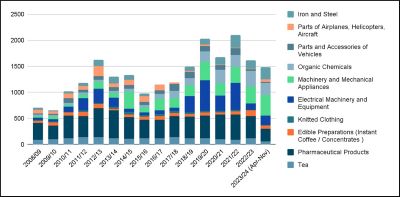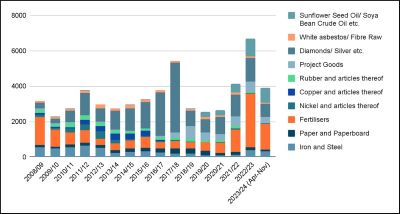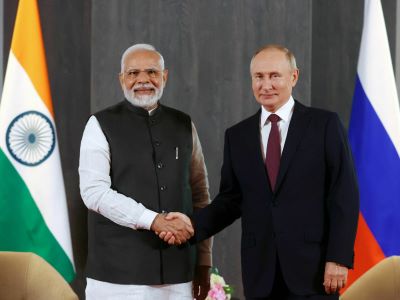Context-
The India-Russia special and privileged strategic partnership, established since 2010, has been anchored in a rich historical foundation and bolstered by political imperatives. Russia's endorsement of India's membership in the Shanghai Cooperation Organisation (SCO) and advocacy for India's inclusion in the UN Security Council underscore its recognition of India's burgeoning role on the global stage.
Russia's 'Turn to the East' Policy
In recent years, Russia has pivoted its economic focus towards Asian countries as part of its 'Turn to the East' policy. This shift aims to rebalance economic relations amidst entwinements with the European Union. The Ukrainian conflict served as a catalyst, prompting Russian elites to explore deeper ties with India.
Challenges in Economic Cooperation
Despite political rapport, economic cooperation between India and Russia has been slow to materialize beyond traditional sectors like military and energy. Strategic projects such as the International North-South Transport Corridor (INSTC) and Free Trade Agreement (FTA) have stalled due to apprehensions amid geopolitical uncertainties.
● Trade Cooperation Amid Uncertainties
The COVID-19 pandemic disrupted global supply chains, fostering protectionist sentiments and exacerbating geopolitical tensions. However, India and Russia exceeded their trade target, with bilateral trade surpassing $49 billion in the 2022-23 financial year, primarily driven by increased imports of discounted Russian oil.
According to official statistics, from April to December 2023, India procured Russian oil amounting to US$34.4 billion, constituting almost 34 percent of all crude oil imports. The robust performance underscores a remarkable adaptability to untoward conditions and secondary sanctions since a considerable share of trade is conducted through 'shadow fleet' and 'grey zones' of international maritime trade as well as third parties such as Singapore, the United Arab Emirates, and Türkiye.
● Resilience in Bilateral Trade
Despite challenges, India's adaptability in trade mechanisms, including utilizing 'shadow fleets' and third-party intermediaries, has ensured a steady flow of Russian oil. Indian ports have emerged as pivotal hubs for oil imports, bolstering energy security and profitability in the refining sector.
● Indian exports of diesel fuel to the Netherlands experienced a several-fold increase, constituting US$12.5 billion, and to Türkiye by 54 percent, exceeding US$3 billion. Similarly, shipments of diesel oil and kerosene constitute two main categories of India’s exports to France, amounting to US$1.2 billion.
Implications of Bilateral Trade Dynamics
While the current trade dynamics benefit both nations, they also expose vulnerabilities to market fluctuations and political decisions. India's increasing reliance on Russian oil prompts caution among Indian companies, potentially hindering collaboration with Russia amidst a shift towards American technology.
- Addressing Trade Imbalances
The imbalance in bilateral trade, exacerbated by the dominance of energy imports, necessitates diversification and strategic realignment. India's exports to Russia remain modest and lack diversification, highlighting the need for a paradigm shift towards strategic cooperation.
Fig- India’s main exports to Russia

Fig- India’s main imports from Russia

- Challenges Beyond the Energy Sector
Logistical challenges, risk of secondary sanctions, and currency issues impede the expansion of bilateral trade beyond energy. The Indo-Russian trade corridor faces operational hurdles, while reliance on third-party currencies poses risks amid Western pressure.
Proposed Solutions and Opportunities
Expanding investment cooperation beyond the energy sector presents promising avenues for bilateral growth. Joint ventures in metallurgy, mechanical engineering, and pharmaceuticals, both domestically and in third countries, offer avenues for diversification.
Enhanced cooperation in biotechnology, agriculture, oil and gas, high technology, space, and IT sectors can drive long-term economic collaboration. Establishing bilateral coordination and investment mechanisms in technology and education sectors can foster innovation and alleviate trade-related challenges.
Conclusion
India-Russia relations demand a paradigm shift towards strategic cooperation to overcome dependence on the energy sector and address trade imbalances. While challenges persist, opportunities abound in diversifying economic ties and fostering scientific and technological collaboration. By prioritizing long-term strategic interests and investing in innovative partnerships, India and Russia can chart a resilient and mutually beneficial path forward.
|
Probable Questions for UPSC Mains Exam-
|
Source - ORF







